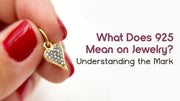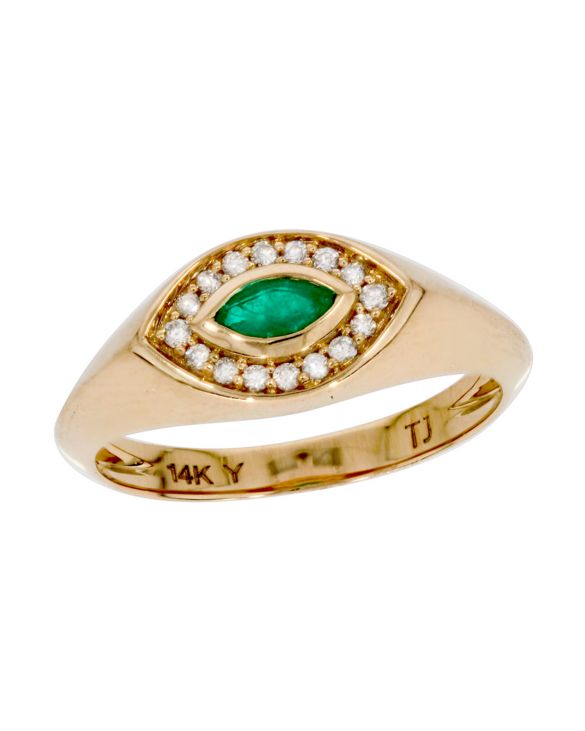When you examine your favorite silver accessories, you might notice a small "925" marking etched into the metal. If you're wondering what does 925 mean on jewelry, this tiny inscription holds significant meaning for jewelry enthusiasts and collectors alike. The numerical designation represents the metal's purity level, specifically indicating that the piece contains 92.5% pure silver content.
The remaining 7.5% consists of other metals, typically copper, which serves a crucial purpose. Pure silver alone is remarkably soft and malleable, making it impractical for everyday wear. By incorporating harder metals into the alloy, craftsmen create durable pieces that maintain their shape and resist damage while preserving silver's lustrous appearance.

The Science Behind Silver Alloys
Why Mix Metals?
Pure silver, while beautiful, presents several challenges for jewelry makers:
- Excessive softness: Pure silver bends and scratches easily
- Wear resistance: Alloys provide superior durability
- Structural integrity: Mixed metals maintain shape better
- Cost effectiveness: Alloys reduce production expenses
The 925 standard emerged as the optimal balance between purity and practicality, offering jewelry lovers the beauty of precious metal with enhanced wearability. Understanding what does 925 mean on jewelry helps consumers make informed purchasing decisions.
Also Read: How to Make Earrings with Beads: Complete DIY Tutorial
Decoding Hallmarks and Quality Marks
International Standards
The 925 marking isn't arbitrary—it represents an internationally recognized standard for silver purity. Different countries may use additional stamps alongside the 925 designation:
Common Hallmark Variations:
- STG or STER: Abbreviated forms indicating authenticity
- 925 Italy: Denotes Italian craftsmanship
- Sponsor marks: Identify the manufacturer or retailer
- Date letters: Show production year (in some systems)
Regional Differences
While 925 serves as the global standard, various regions have developed their own marking systems:
|
Region |
Common Marks |
Significance |
|
United States |
925, STER |
Standard purity indicators |
|
United Kingdom |
925, Lion Passant |
Includes assay office marks |
|
Italy |
925 IT, 925 Italy |
Emphasizes Italian craftsmanship |
|
Germany |
925, Crescent Moon |
Includes fineness marks |

What Does 925 Italy Mean on Jewelry - Italian Craftsmanship Excellence
Heritage of Excellence
Italy has earned worldwide recognition for exceptional metalworking skills passed down through generations. When you see "925 Italy" stamped on jewelry, you're viewing pieces created by artisans who blend traditional techniques with modern innovation. Many people ask what does 925 Italy mean on jewelry, and the answer reflects both purity standards and superior craftsmanship quality.
Italian jewelers are particularly renowned for:
- Intricate detailing: Complex patterns and textures
- Chain construction: Sophisticated linking techniques
- Surface treatments: Unique finishes and textures
- Design innovation: Contemporary styling approaches
Quality Distinctions
While all 925-marked jewelry meets the same purity standards, Italian pieces often showcase superior craftsmanship. The attention to detail, finishing quality, and design sophistication typically justify premium pricing for Italian-made accessories.
Types of Jewelry Featuring 925 Marks
Rings and Wedding Bands
Silver rings with 925 markings offer affordable elegance for various occasions. From simple bands to elaborate cocktail rings, this metal provides versatility for different styles and budgets. When customers ask what does 925 stamped on jewelry mean, the answer confirms authenticity and quality standards.
Necklaces and Pendants
Chain necklaces represent one of the most popular applications for 925 silver. The metal's strength allows for intricate link patterns while maintaining affordability compared to gold alternatives.
Bracelets and Bangles
Whether delicate tennis bracelets or bold statement pieces, 925 silver provides the durability needed for wrist accessories that endure daily movement and contact.
Earrings
From simple studs to elaborate chandelier designs, 925 silver offers hypoallergenic properties that make it suitable for sensitive ears.

925 Marks on Mixed-Metal Jewelry
Gold-Plated Silver
Finding 925 stamps on gold-colored jewelry isn't unusual. This indicates a silver base with gold plating, creating an affordable alternative to solid gold pieces. Many shoppers wonder what does the number 925 mean on jewelry when they see it on gold items - it confirms the underlying silver content. This combination is called "gold vermeil" when the gold layer meets specific thickness requirements.
Gemstone Settings
Many rings and pendants featuring diamonds, sapphires, or other precious stones use 925 silver as the setting material. The stamp confirms the metal's quality while keeping costs reasonable compared to platinum or gold settings. For those wondering what does the number 925 on jewelry mean in gemstone settings, it indicates the base metal quality without affecting stone authenticity.
Important Note: The 925 mark only indicates the metal's purity—it doesn't guarantee the authenticity of any gemstones present. Collectors frequently ask on jewelry what does 925 mean, and the answer specifically relates to silver content, not stone quality.
Also Read: Waist Beads Meaning: African Origins & Spiritual Use
Identifying Authentic 925 Jewelry
Physical Inspection Tips
Visual Examination:
- Look for clear, well-defined stamps
- Check for consistent markings across similar pieces
- Examine the overall finish quality
Weight Test:
- Authentic pieces feel substantial
- Fake items often seem unusually light
- Compare with known authentic pieces
Magnet Test:
- Real silver shows minimal magnetic attraction
- Strong magnetic pull indicates fake materials
- Use a strong neodymium magnet for testing
Red Flags to Avoid
Warning Signs of Fake 925 Stamps:
- Poorly impressed or unclear markings
- Inconsistent stamp placement
- Unusual weight for the item's size
- Excessive magnetic attraction
- Suspiciously low prices from unknown sellers
Caring for Your 925 Silver Jewelry
Daily Maintenance
Cleaning Routine:
- Use soft, lint-free cloths for regular polishing
- Remove tarnish with specialized silver cleaning cloths
- Avoid abrasive materials that could scratch surfaces
- Clean after each wear to prevent buildup
Storage Solutions
Proper Storage Methods:
- Use anti-tarnish pouches or cloths
- Store in cool, dry environments
- Separate pieces to prevent scratching
- Avoid exposure to air and moisture
Professional Care
For valuable or intricate pieces, consider professional cleaning services. Jewelers have specialized equipment and solutions that can restore heavily tarnished items without damage.
Investment Value and Collectibility
Market Considerations
While 925 silver doesn't typically appreciate like gold, certain pieces can gain value through:
- Designer recognition: Pieces from renowned makers
- Vintage appeal: Older items with historical significance
- Craftsmanship quality: Exceptional workmanship
- Rarity factors: Limited production pieces
Collection Strategies
Smart collectors focus on:
- Brand reputation: Established manufacturers
- Condition preservation: Proper care and storage
- Documentation: Maintaining purchase records
- Market research: Understanding current trends
Common Misconceptions About 925 Jewelry
Myth: 925 Only Appears on Silver
Reality: The 925 mark can appear on various items containing silver alloys, including gold-plated pieces where silver serves as the base metal. Understanding what does 925 on jewelry mean helps distinguish between different metal combinations and their applications.
Myth: All 925 Jewelry is Hypoallergenic
Reality: While pure silver is generally safe for most people, the copper and other alloys in 925 silver can cause reactions in individuals with specific metal sensitivities.
Myth: Higher Numbers Mean Better Quality
Reality: 925 represents the optimal balance for jewelry. Higher silver content (like 999) creates softer, less durable pieces unsuitable for regular wear.
Making Informed Purchases
Research Before Buying
Essential Steps:
- Verify seller reputation through reviews and ratings
- Request authenticity certificates for expensive pieces
- Compare prices across multiple vendors
- Understand return policies before purchasing
Questions to Ask Sellers
- Is the piece genuinely marked 925?
- What is the country of origin?
- Are there any treatments or coatings applied?
- What warranty or guarantee is provided?
- Can you provide documentation of authenticity?
- What does 925 mark on jewelry mean for this specific piece?
Future Trends in 925 Silver Jewelry
Sustainable Practices
Modern consumers increasingly value environmentally conscious production methods. Many manufacturers now emphasize:
- Recycled silver content
- Ethical sourcing practices
- Reduced environmental impact
- Fair labor conditions
Design Innovation
Contemporary designers continue pushing creative boundaries with 925 silver, incorporating:
- Mixed metal combinations
- Alternative textures and finishes
- Technology integration
- Customization options
Conclusion
Understanding what does 925 mean on jewelry empowers you to make informed jewelry purchases and properly care for your pieces. This simple stamp represents a perfect balance between purity and practicality, offering beauty and durability at accessible price points.
Whether you're building a collection, searching for the perfect gift, or simply wanting to understand your existing jewelry better, knowledge of 925 markings serves as your guide to quality and authenticity in the silver jewelry market.
Remember that while the 925 stamp provides important information about metal content, it's just one factor in determining a piece's overall value and appeal. Consider craftsmanship, design, brand reputation, and personal preference when making your final selection.
Frequently Asked Questions
What does the number 925 mean on jewelry?
The number 925 on jewelry indicates that the piece contains 92.5% pure silver content. This marking represents the international standard for sterling silver, where the remaining 7.5% consists of other metals (typically copper) to enhance durability and strength. This precise composition creates the perfect balance between silver's natural beauty and practical wearability for everyday jewelry pieces.
Is 925 jewelry valuable or worth investing in?
925 jewelry holds intrinsic value due to its silver content and craftsmanship quality. While it may not appreciate as rapidly as gold investments, high-quality 925 pieces can become collectible, especially those from renowned manufacturers or featuring exceptional artistry. The combination of affordability, durability, and timeless appeal makes 925 jewelry an excellent choice for both personal enjoyment and potential long-term value retention.
Does 925 mark on jewelry mean it's real silver?
Yes, the 925 stamp confirms that the jewelry contains 92.5% pure silver, qualifying it as authentic sterling silver. However, it's crucial to purchase from reputable dealers, as counterfeit pieces may feature fake stamps. Always verify authenticity through proper inspection, weight testing, and purchasing from trusted sources to ensure you're getting genuine sterling silver jewelry.
Can you wear 925 silver every day?
Absolutely! 925 silver is specifically designed for daily wear, offering excellent durability and tarnish resistance. Its enhanced strength from metal alloys makes it suitable for regular use without compromising appearance. To maintain its lustrous finish, avoid exposure to harsh chemicals, perfumes, and excessive moisture. With proper care, 925 silver jewelry will retain its beauty and integrity through years of daily wear.
What does 925 mark on jewelry mean if found on gold pieces?
When you find a 925 stamp on gold-colored jewelry, it indicates that the base metal is sterling silver with gold plating or gold vermeil coating. This combination offers the luxurious appearance of gold at a more accessible price point while maintaining the quality foundation of sterling silver. The 925 mark confirms the underlying metal's purity standard, regardless of the surface treatment.
Is 925 sterling silver hypoallergenic?
925 sterling silver is generally considered hypoallergenic due to its high pure silver content (92.5%). However, some individuals may experience sensitivity reactions to the copper or other alloys present in the remaining 7.5%. People with known metal allergies should test a small area before wearing sterling silver jewelry extensively, or consider higher purity alternatives if sensitivity occurs.
Always purchase jewelry from reputable dealers like Tresor Jewelry Inc and don't hesitate to ask questions about authenticity, care instructions, and warranty coverage. Your investment in quality 925 silver jewelry will provide years of enjoyment when properly selected and maintained.


